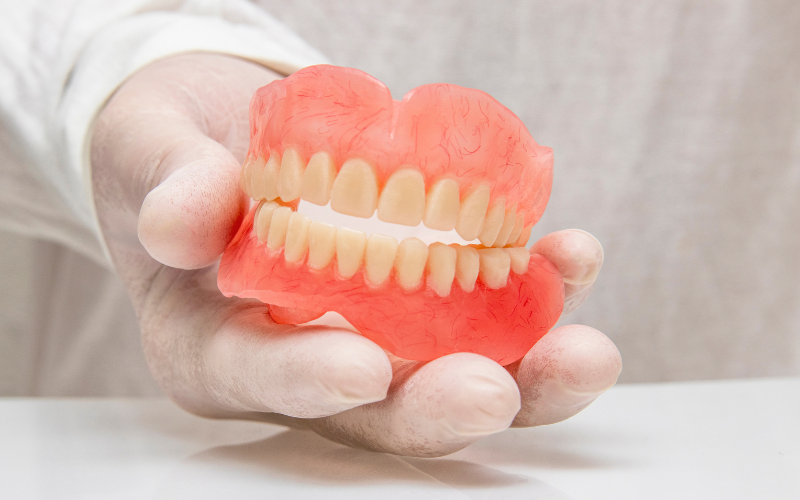Brentwood: (615) 235-1966

Is It Time for New Dentures? Watch for These Signs
Brentwood, TN

As we age, our dental health becomes increasingly important for our overall well-being. Dentures play a crucial role in restoring functionality and confidence to individuals who have lost their natural teeth. However, over time, dentures may begin to show signs of wear and tear, indicating the need for replacement. In this blog, we’ll explore the telltale signs that it may be time for new dentures, ensuring that you maintain optimal oral health and quality of life.
Dentures serve as a lifeline for many individuals, allowing them to eat, speak, and smile with confidence. Yet, like any prosthetic device, dentures have a lifespan and require regular maintenance to ensure their effectiveness. By understanding the indicators of deteriorating dentures and the importance of proper care, you can take proactive steps to address any issues and maintain your oral health. Read on to find out the key signs that signal the need for new dentures, empowering you to make informed decisions about your dental care.
Signs It’s Time for New Dentures
As dentures age, they may begin to exhibit signs of wear and tear, impacting their fit and functionality. Recognizing these signs is crucial for maintaining optimal oral health and quality of life. Here are some indicators that it may be time for new dentures:
Ill-fitting dentures causing discomfort:
- If your dentures no longer fit properly and cause discomfort or irritation, it may be a sign that they need to be replaced.
- Ill-fitting dentures can lead to sore spots, difficulty chewing, and speech problems, affecting your daily life.
Visible wear and tear on dentures:
- Check for signs of wear such as cracks, chips, or worn-down teeth on your dentures.
- Visible deterioration indicates that your dentures may not provide the necessary support and functionality anymore.
Difficulty chewing or speaking with dentures:
- If you experience difficulty chewing certain foods or notice changes in your speech while wearing dentures, it could be a sign that they are no longer effective.
- Properly fitting dentures should allow for comfortable chewing and clear speech.
Changes in facial structure or appearance:
- Changes in the way your dentures fit can lead to alterations in your facial structure or appearance.
- If you notice sagging or changes in the shape of your face, it may be due to poorly fitting dentures that no longer provide adequate support.
Irritation or sores in the mouth due to dentures:
- Persistent irritation, redness, or sores in the mouth caused by dentures can indicate that they are causing friction or pressure on the gums.
- New dentures with a better fit can help alleviate these discomforts and prevent oral health issues.
Persistent bad breath despite oral hygiene efforts:
- If you experience persistent bad breath despite practicing good oral hygiene, it may be due to bacteria accumulating on ill-fitting or deteriorating dentures.
- New dentures can help improve oral health and eliminate persistent bad breath.
Importance of Proper Denture Maintenance
Proper maintenance of dentures is essential for ensuring their longevity and preserving oral health. By following appropriate care routines and avoiding damaging habits, denture wearers can enhance their overall well-being. Here’s why maintaining dentures is crucial:
- Regular cleaning and care routines: Consistent cleaning helps prevent plaque buildup, stains, and bacterial growth on dentures, promoting oral hygiene.
- Avoiding harmful habits: Refrain from chewing on hard objects, using abrasive cleaning agents, or exposing dentures to hot water to prevent damage and deterioration.
- Importance of regular dental check-ups: Routine dental visits enable dentists to assess denture fit, detect any issues early on, and provide necessary adjustments or replacements for optimal comfort and function.
By prioritizing proper maintenance, denture wearers can enjoy improved oral health and prolong the lifespan of their prosthetic teeth.
Types of Dentures Available
When considering denture options, individuals have several choices tailored to their specific needs and preferences:
Conventional Full Dentures:
- Designed to replace all teeth in the upper or lower jaw.
- Custom-made to fit the patient’s mouth comfortably.
- Require sufficient jawbone support for stability.
Partial Dentures:
- Used when some natural teeth remain in the mouth.
- Comprise replacement teeth attached to a gum-colored base.
- Secured in place using clasps or precision attachments.
Implant-Supported Dentures:
- Supported by dental implants surgically placed into the jawbone.
- Offer enhanced stability and functionality compared to traditional dentures.
- Prevent bone loss and maintain facial structure over time.
Flexible Dentures:
- Made from a flexible material, such as nylon or thermoplastic resin.
- Provide a more comfortable and natural feel compared to rigid dentures.
- Ideal for patients with irregular jaw ridges or those prone to oral sensitivity.
Each type of denture offers unique benefits and considerations, allowing individuals to choose the option best suited to their lifestyle and oral health needs.
Consultation with a Dentist
Seeking professional guidance from a dentist is crucial when considering new dentures. Here’s what to expect during the consultation process:
Importance of Seeking Professional Advice:
- Dentists assess oral health status and determine the need for new dentures.
- Expert evaluation ensures appropriate treatment planning and personalized care.
- Dentists can address concerns, provide recommendations, and answer questions regarding denture options and maintenance.
Steps Involved in Getting New Dentures:
- Initial examination to assess oral health and discuss treatment goals.
- Taking impressions of the mouth to create customized dentures.
- Fitting appointments to ensure proper comfort and functionality.
- Follow-up visits for adjustments and ongoing care.
Customization Options Available for Dentures:
- Choice of denture materials, including acrylic, porcelain, or flexible resin.
- Selection of tooth shape, size, and color for a natural appearance.
- Options for implant-supported dentures or partial dentures based on individual needs.
- Consulting with a dentist allows individuals to explore these options and make informed decisions about their denture treatment plan.
Cost Considerations and Insurance Coverage
When contemplating new dentures, it’s essential to consider the financial aspects and potential insurance coverage:
Factors Influencing the Cost of New Dentures:
- Type of dentures chosen (conventional, partial, implant-supported, etc.).
- Materials used in denture construction (acrylic, porcelain, etc.).
- The complexity of the denture fitting process and any additional procedures required.
- Geographic location and the expertise of the dental provider.
Options for Financing New Dentures:
- Payment plans or financing options are offered by dental practices.
- Healthcare financing programs or credit lines are designed for dental expenses.
- Flexible spending accounts (FSAs) or health savings accounts (HSAs) that may cover dental costs.
Understanding Insurance Coverage for Denture Replacement:
- Reviewing dental insurance policies to determine coverage for new dentures.
- Checking for limitations, deductibles, and annual maximums that may affect coverage.
- Exploring supplementary dental insurance or discount plans for additional assistance.
- Considering these factors and exploring financing options can help individuals plan for the cost of new dentures and maximize insurance benefits where available.
Staying attuned to the signs indicating the need for new dentures is crucial for maintaining oral health and overall well-being. Regular maintenance and professional guidance are paramount in ensuring the longevity and effectiveness of dentures. Your dental health matters, and addressing the need for new dentures promptly can significantly enhance your quality of life.




